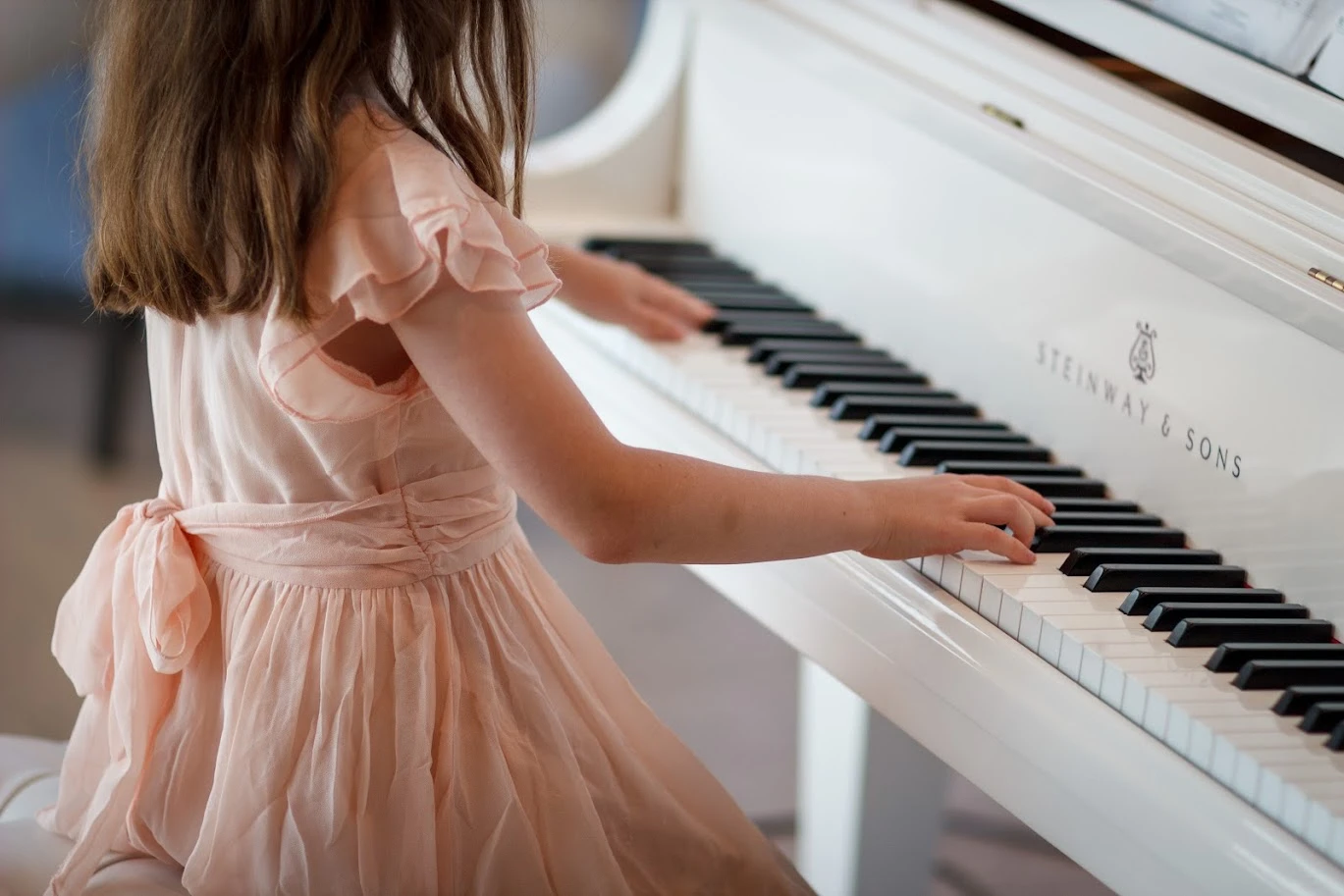Have you ever experienced seeing that one kid perform and thinking to yourself, “How is that kid so confident?” At our school in Los Angeles, the Angeles Academy of Music, every year, we see a huge transformation in kids who come to us for vocal lessons.
Singing is a joyful expression that brings people together, but for children, it offers so much more than just a love of music. From boosting self-confidence to enhancing communication skills, singing lessons can unlock a range of developmental benefits that help kids flourish both in and out of the classroom.
Many parents tell us how they witnessed their kids become more open, less shy, more expressive, and more disciplined after starting their singing lessons. Some kids also improved academically with these creative lessons.
So whether your child dreams of performing on stage or simply wants to explore their musical interests, the structured guidance of vocal training can nurture an artist in them and build discipline and emotional well-being.
So, we will be discussing in more detail how investing in singing lessons can make a lasting difference in your child’s growth and happiness.
Building Confidence and Self-Expression

Singing encourages kids to step out of their comfort zones and express themselves through music. As they gain mastery over their voice, children develop self-assurance in their music education and learn to perform in front of others without fear.
For example, we have had many children at our school who initially felt shy about singing in front of a teacher and gradually progressed to confidently performing in a recital or school talent show.
As these kids gain mastery over their voices, they develop self-assurance, learning to perform in front of others without fear. This newfound confidence often extends beyond music, helping them excel in public speaking, classroom participation, and social interactions as they become comfortable sharing their ideas and opinions.
Improving Communication and Listening Skills
Vocal lessons help children develop clear, confident communication skills through a variety of targeted vocal techniques. Lessons typically emphasize key areas such as diction (the crisp articulation of words), breath control (using the diaphragm to support speech and sound), and tone (modulating voice quality to convey emotion and meaning).
For instance, a vocal warm-up exercise might involve repeating phrases while focusing on pronouncing each syllable clearly and projecting the voice from the chest rather than speaking in a whisper or mumble.

Kids quickly learn how to control their breath to sustain long phrases and adjust their tone to sound more expressive. As they refine these techniques, they also improve their ability to present ideas clearly in class discussions or storytelling activities.
These practices directly translate to improved speaking abilities in everyday life. They learn to actively listen to music, instructors, and fellow students, sharpening their ability to process information and respond thoughtfully, a skill set beneficial in both social and academic settings.
Developing Discipline and Focus
Regular practice and structured lessons instill a sense of discipline. Kids learn to focus on techniques such as breath control, pitch accuracy, and rhythm. Over time, this focus translates into better concentration skills that are essential for schoolwork and other extracurricular activities.
I remember when I first started practicing, it taught me how to focus as it was so effortless, but it did fire the “focus” neurons in my brain, which expanded to other areas of my life as well.

For example, a young singer might practice holding a note while gradually increasing volume without wavering off-pitch. This process requires the child to listen closely to their own voice, adjust breathing patterns, and maintain precise timing, a skill set comparable to focusing on complex math problems or following multi-step instructions in school.
The persistence developed through daily practice empowers children to stay on task, work through challenges, and celebrate progress along the way.
Enhancing Cognitive and Academic Abilities
Studies show that music education supports cognitive development, improving memory, problem-solving skills, and even math abilities. Singing involves reading sheet music, following patterns, and counting beats, all of which help sharpen a child's analytical thinking.
When learning a song, kids must memorize sequences of notes, lyrics, and timing, reinforcing both short-term and long-term memory. They also engage in problem-solving by figuring out how to adjust their vocal technique to hit the right pitch or correct mistakes in phrasing. The constant mental engagement involved in singing sharpens focus and builds cognitive flexibility that benefits learning across subjects.
Legendary musician and humanitarian Bono from U2 once highlighted the transformative impact of music, saying, “Music can change the world because it can change people.” For kids, this change begins with improved brain function and heightened problem-solving abilities that contribute to both academic success and lifelong learning skills.
Encouraging Creativity and Emotional Expression
Through singing, kids explore storytelling, emotions, and musical styles, which becomes a creative outlet that allows them to process and express their feelings, helping them develop emotional intelligence.
Whether interpreting lyrics or improvising melodies, children tap into their imagination and creativity.

Research underscores the importance of emotional expression in a child's development. A study published in Frontiers in Psychology found that engaging in creative activities like singing helps children better regulate their emotions, leading to improved mental health and social interactions.
Children who express their emotions through music are also more likely to develop empathy as they learn to connect with the feelings conveyed in lyrics and melodies.
Creating Social Connections and Teamwork Opportunities
Whether participating in group lessons, choirs, or school performances, singing fosters teamwork and collaboration. Children learn to harmonize, blend voices, and support each other, creating a sense of community and shared purpose.
For instance, in a school choir, students are often assigned different vocal parts, such as soprano, alto, tenor, or bass, depending on their vocal range. To create a cohesive sound, they must listen attentively to each other and adjust their volume and pitch to blend harmoniously with the group.

In school performances, teamwork extends beyond just the music. Kids might work together to plan choreography, design costumes, or prepare stage setups.
They learn to collaborate, share ideas, and divide responsibilities, which fosters a sense of ownership and pride in the final production. These experiences also teach valuable life skills like communication, problem-solving, and adaptability as they navigate creative differences and unexpected challenges.
Whether it’s brainstorming themes, coordinating rehearsals, or troubleshooting technical glitches, each student plays a vital role in bringing the performance to life. This collective effort not only enhances the quality of the show but also builds a strong sense of community and mutual respect among the participants.
For example, a group of students preparing for a musical theater production might split into committees to handle these different aspects. This level of collaboration builds skills like delegation, problem-solving, and mutual respect.
Aiding in Ear Training and Learning Other Instruments
A study published in Music Perception: An Interdisciplinary Journal found that vocal training improves pitch accuracy and the ability to distinguish between subtle tonal differences, skills essential for advanced musical development.
This foundational training directly enhances a child’s ability to play other instruments. Other studies revealed that students with strong ear training from vocal lessons performed better in instrumental music, as they could more accurately replicate melodies and rhythms.
By internalizing the intervals and patterns they sing, children develop a musical “vocabulary” that makes it easier to identify and replicate these elements on instruments like piano, violin, or guitar.
Kids with strong ear training can often pick up new instruments faster and excel in music theory studies.
Singers Become Great Musicians Through Breathing and Phrasing
Breath control and phrasing are essential components of vocal training, helping singers learn how to sustain notes and convey musical phrases with expression. As a pianist, I have experienced my early childhood singing lessons, which taught me how to approach musical phrases with intention and artistry.
Singing helped me understand how to “breathe” through a piece of music and added more rhythm to it because of the patterns of breathing I learned and internalized. As I play piano, I unconsciously think about where a vocalist would take a breath, shaping the melody to make it feel more natural and expressive.

This awareness translates into smoother phrasing, a better sense of dynamics, and a more emotionally engaging performance. The same principles apply to other instrumentalists as well.
For wind and brass players, this skill is directly transferable, as controlled breathing is vital for producing clear, sustained tones. Even string players and percussionists benefit from learning to “breathe” with their music, as it helps them phrase their parts more musically and maintain a sense of rhythm and flow.
In addition to shaping phrasing, vocal training emphasizes the emotional intent behind every note and phrase. I remember one of my teachers, who was primarily a vocalist but also taught percussion, had a unique approach to teaching. Before letting us touch the instruments, he would have us vocalize the rhythms, emphasizing different accents, rhythmic patterns, volume dynamics, and sustained percussive sounds.
His goal was to ensure that the emotional depth and musicality of the rhythms would seamlessly translate into our instrument playing.
Fostering a Lifelong Appreciation for Music
Beyond the technical skills, singing lessons have a lifetime value and help children develop a love for music that often stays with them throughout their lives.
Children are introduced to diverse genres and styles, from classical and jazz to pop and folk, broadening their cultural awareness and understanding. This exposure helps them connect with music on a personal level, fostering both enjoyment and curiosity.
Moreover, learning the nuances of vocal expression, melody, and rhythm deepens their ability to appreciate the artistry behind every song they hear. Singing also builds an emotional connection to music as they experience the joy of performing and the comfort it brings in challenging times.

Healing, Holistic Growth, and Emotional Support
“I think music in itself is healing. It's an explosive expression of humanity. It’s something we are all touched by. No matter what culture we’re from, everyone loves music.” - Billy Joel
Whether a child is dealing with stress, navigating social challenges, or simply seeking a creative outlet, vocal training can sometimes become a form of therapy. Studies have shown that singing can reduce levels of cortisol, the stress hormone, and release endorphins, the “feel-good” chemicals that elevate mood and foster a sense of well-being.
At Angeles Academy of Music, we’ve seen shy students gradually open up as they practice songs that resonate with their personal experiences. Learning to sing and perform in a supportive environment gives them a safe platform to share their emotions, develop confidence, and feel a sense of achievement.
On a holistic level, music encourages a balance between emotional and physical health. Controlled breathing techniques used in vocal training can improve lung capacity and enhance overall relaxation, while the mental focus required for singing helps children build concentration and mindfulness.
Furthermore, singing is uniquely positioned to build a sense of identity and self-worth. Through their vocal journey, children discover their unique voice, literally and figuratively. They may learn to celebrate their individuality and authenticity through art, take pride in their progress, and use their voice as a tool for personal empowerment and creative expression.
Conclusion
Through vocal lessons, children develop essential life skills, such as effective communication, teamwork, and resilience, while exploring their individuality and emotional depth.
Singing connects children with the universal language of music, enriching their cultural understanding and developing a lifelong appreciation for its power and beauty.
At Angeles Academy of Music in Los Angeles, we witness these incredible transformations every day. Our experienced instructors are dedicated to creating a nurturing environment where your child can thrive musically and personally.
Give your child the gift of music and self-discovery. Enroll them in singing lessons at the Angeles Academy of Music and watch them flourish into confident, creative individuals. Contact us today for the best singing lessons in Los Angeles, and schedule your first lesson!
If you liked this article, you would likely find our post on the benefits of music education at every age fascinating. Check it out!
.svg)
.svg)
.svg)
.svg)
.svg)
.svg)





.svg)